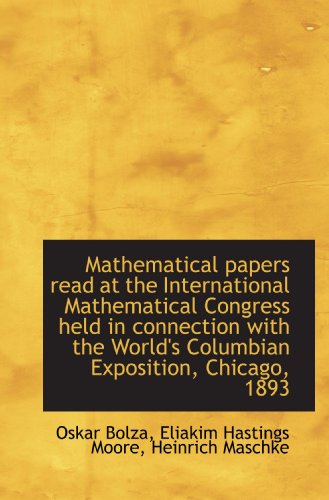Background
Heinrich Maschke was born on October 24, 1853 in Breslau, Germany, where his father was owner of the Raths-Apotheke and had a position of considerable importance in the medical profession.



(This is a pre-1923 historical reproduction that was curat...)
This is a pre-1923 historical reproduction that was curated for quality. Quality assurance was conducted on each of these books in an attempt to remove books with imperfections introduced by the digitization process. Though we have made best efforts - the books may have occasional errors that do not impede the reading experience. We believe this work is culturally important and have elected to bring the book back into print as part of our continuing commitment to the preservation of printed works worldwide. This text refers to the Bibliobazaar edition.
https://www.amazon.com/Mathematical-papers-International-Congress-connection/dp/1116963906?SubscriptionId=AKIAJRRWTH346WSPOAFQ&tag=prabook-20&linkCode=sp1&camp=2025&creative=165953&creativeASIN=1116963906
Heinrich Maschke was born on October 24, 1853 in Breslau, Germany, where his father was owner of the Raths-Apotheke and had a position of considerable importance in the medical profession.
As a student Heinrich showed marked ability in the Gymnasium of that city, and in 1872 he entered the University of Heidelberg, where he came under the influence of Konigsberger. After serving his required term of one year in the army, he went to Berlin and here studied under Weierstrass, Kummer, and Kronecker. Proceeding to Göttingen, he received his doctor's degree there in 1880.
After teaching for a few years in the Luisenstädtische Gymnasium in Berlin, he returned to Göttingen for a year's work (1886 - 87) under the direction of Prof. Felix Klein. He then resumed his position in Berlin, also taking up the study of electrotechnics at the Polytechnicum in Charlottenburg. In 1890, however, he resigned his position in the Gymnasium in order to do practical work in the Berliner Allgemeine Electricitätsgesellschaft. The following year he completed his technical training in the Polytechnicum at Darmstadt, under Professor Kittler. Feeling at this time that there were greater opportunities for him in America, he came to the United States in the spring of 1891, did some work for a year with the Western Electrical Instrument Company, Newark, N. J. , and in 1892 was called to the University of Chicago as assistant professor of mathematics. He devoted the remainder of his life to the training of mathematicians and to assisting in building up and maintaining a strong department in that university.
Among those of foreign birth who have contributed notably to the advance of mathematics in the United States, he holds high rank. Maschke's original work in pure mathematics may be said to have begun with his memoir Ueber die quaternäre endliche, lineare Substitutionsgruppe der Borchardtschen Moduln (1887), developed under the inspiration of Klein's courses in Göttingen. This carried him extensively into the theory of finite groups of linear substitutions, a subject already attracting attention in this country through the translation of Eugene Netto's work on the theory of substitutions by Frank Nelson Cole and the latter's work at Ann Arbor and Columbia. His second line of major activity lay in the theory of quadratic differential quantics and led to the development of a symbolic method for the treatment of differential quantics, a study which occupied his attention during his later years.
(This is a pre-1923 historical reproduction that was curat...)
He was a teacher of great ability and his courses were made more valuable by his all-round culture, by his originality of thought, and by his personal interest in the large numbers of young mathematicians who attended his lectures.
Maschke was married to Theresa; they had no children.
